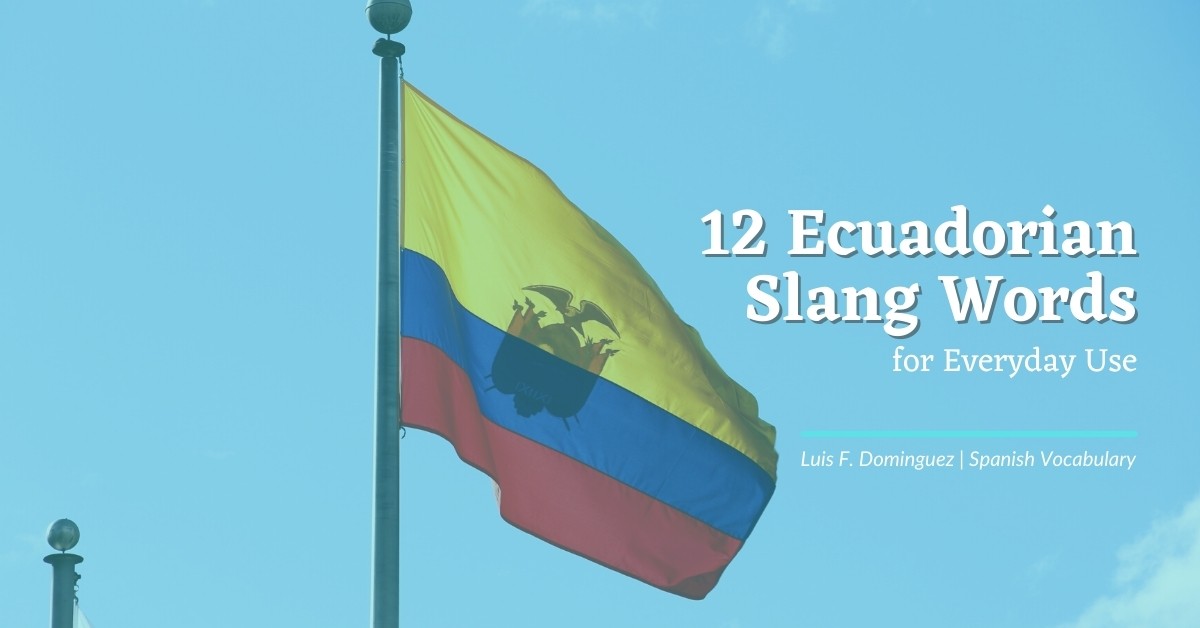
12 Ecuadorian Slang Words for Everyday Use
Ecuadorian slang, just like any other slang in the world, has some distinctive and unique words that only Ecuadorian people understand. Unless, that is, you learn them from an insightful online blog such as this one.
Ecuador is a beautiful country with a colorful culture that enriches the Spanish language with new informal words coming from its streets. These words are called slang and in this post you’ll learn a lot about Ecuadorian slang and why you should learn it. Plus, I’ll introduce you to 12 of the most common slang words used in Ecuador and give you examples of how to use them.
What Is Slang?
If you have followed our series on Latin American slangs, you may already be familiar with the term. In case you need it, here is a quick reminder:
According to Lexico, slang is “a type of language consisting of words and phrases that are regarded as very informal, are more common in speech than writing, and are typically restricted to a particular context or group of people.”
In the case of Ecuadorian slang, the “particular context” is the country of Ecuador and the group of people is Ecuadorians themselves. Of course, you can learn it even if you are not part of that specific context or group of people.

Why You Should Learn Ecuadorian Slang
Because it’s part of the Ecuadorian culture and, in consequence, of the larger Latin American culture that gives life and defines the Spanish language on this side of the world.
Learning a language is not only learning vocabulary, grammar rules, and conjugations, but also learning a culture. When you do, that’s when you really start to understand how the language works.
You should also learn Ecuadorian slang if you plan to visit the country, either as a tourist, a retiree, or for a career opportunity. Learning the slang of the country gives you an excellent introduction to its culture.
12 Useful Ecuadorian Slang Words
Some of the words included on this list, may also be used in other Latin American countries, although they may have slight differences in meaning or spelling.
Let’s see some of the most common Ecuadorian slang words organized by three categories: words that express that something is good or “cool,” terms used to refer to people, and unique words that didn’t fit in any other category.
Cool
It’s amazing to learn how many words people invent to express that something is “cool.”
1. Bacán
Bacán is one of the most Ecuadorian of words. It’s a variation of bacano, used in other countries in the region such as Colombia and Bolivia. You can say bacán to express that something is cool, good, or awesome.
¡Está bacán tu casa!
Your house is cool!
2. Chévere
Another that means that something is good or cool, chévere is actually a very common word across the continent, as it’s used in nearby countries such as Colombia and Bolivia, but also as far to the north as Mexico.
¡Qué chévere está la fiesta!
This party is cool!
3. Fresco
Fresco has a slightly different meaning, it’s also a positive one, but not exactly cool. Fresco conveys an idea of relaxation, of a chill attitude towards life.
– ¿Cómo estás hermano?
– ¡Todo fresco!
– How are you bro?
– Here, just chilling out!
People
Use these Ecuadorian slang words to refer to people in different situations.
4. Chapa
A chapa is a cop, a policeman. It’s an informal way to refer to law enforcement officers and it’s understood throughout the country. It also works in plural.
¡Ahí vienen los chapas!
The cops are coming!
5. Pana
Pana is a word similar to “buddy” in English. You use it to talk to a very good friend, someone with whom you feel at ease and with enough confidence to talk with in informal terms.
Oye pana, ¿vienes a la playa mañana?
Hey buddy, are you coming to the beach tomorrow?
6. Cholo
Although cholo also exists in Mexican slang, its meaning in Ecuador is a little bit different. In Ecuadorian slang a cholo is a person with bad taste or tacky behavior.
Tu amigo es un cholo.
Your friend is very tacky.
7. Guacharnaco
This word fascinates me, not only for its eloquent sound, but because I can also see a similarity with another Mexican slang word: naco. A guacharnaco is pretty much the same as a cholo, a person without education or good taste, which is also the meaning of naco in Mexico.
¡No seas guacharnaco por favor!
Please, don’t be so tacky!
8. Ñaño
In Ecuadorian slang your ñaño is your brother and your ñaña your sister.
Mañana es la fiesta de mi ñaña.
Tomorrow is my sister’s party.
9. Chiro
When you run out of money in Ecuador, you can say that you’re chiro.
Papá, ¿me das algo de dinero? Estoy chiro.
Dad, can you give me some money? I have no money at all.
Miscellaneous
This category has three words that are unrelated and didn’t fit into any other category.
10. Policía acostado
This one’s my favorite word of Ecuadorian slang. It literally means “laying down policeman,” however its true meaning is much more simple: speed bump. I love the analogy and the creativity of Ecuadorian people.
Reduce un poco la velocidad que ahí adelante hay un policía acostado.
Slow down a little bit, because there’s a speed bump over there.
11. Caleta
Although caleta is an actual word in Spanish meaning “cove,” but in Ecuadorian slang it refers to a house. Isn’t the image beautiful? Now, I want to have my own cove to live in.
Me voy a mi caleta que ya es tarde.
I’m going to my house, it’s getting late.
12. Farra
Farra is an Ecuadorian slang word that means “party.” Of course, everybody will understand you if you simply say fiesta, but it won’t have the local flavour that farra expresses.
¿Cómo estuvo la farra anoche?
How was the party last night?
Practice Your Ecuadorian Slang
The best thing you can do to incorporate these Ecuadorian slang words into your Spanish vocabulary is to practice them in real-life conversations. That’s the only way for you to know if you’re using them correctly or not. Sign up for a free class at Homeschool Spanish Academy to practice Spanish with our certified Spanish teachers from Guatemala whose dialect is easy to understand and perfect for learners of every level!

- Earth Day Projects for Kids + Spanish Earth Day Vocabulary
- How to Talk About the Temperature in Spanish: Fahrenheit, Celcius, and Descriptions
- Car Parts Spanish Vocabulary List: Learn Using Pictures
- Top 15 New Year’s Resolutions in Spanish
- Talk About Hurricanes And The Weather in Spanish
- Spanish Words with Multiple Meanings in Latin America
- World Mental Health Day: A Vocabulary Guide for Mental Health Workers
- Expressing Appreciation in Spanish on World Teachers’ Day
- Language Learning with Netflix: How to Use the Chrome Extension - April 18, 2024
- 23 Common Spanish Prepositions You Can Use Today - March 27, 2024
- 25 Common Subjunctive Phrases in Spanish Conversation - March 21, 2024




